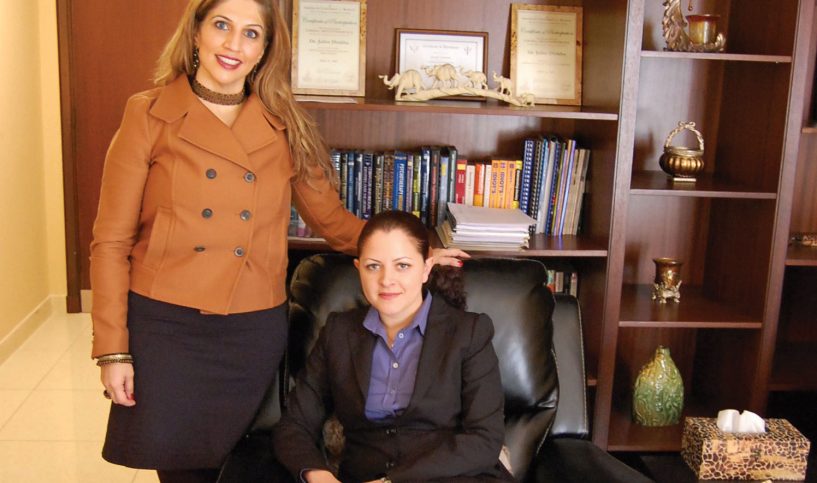Changing things up at the Kaizen offices, and settling into Dr. Juliet’s comfy chair, the bazaar team takes the lead in talking to the lovely Dr. Juliet and Dr. Nisrine about their role at Kaizen, the inception of ‘Mind Bubble’, and what it’s like to work as a psychologist in Kuwait.
Hi Drs.! Tell us about yourselves.
Nisrine: I grew up in Kuwait, and then left to the states to pursue my studies. It was a very natural decision for me to come back to Kuwait as my family is based here.
Juliet: I was born here, yet we immigrated to the US when I was very young. After thirty-some years, getting married, and having my first child, AUK was offering a position to teach psychology. Coming back here was a very easy decision for me because I wished for my son to have an Arab upbringing, just like I did. Because I was a licensed clinical psychologist, I told the university that I needed to practice.
Nisrine: When I came back here, we were at different practices, and we thought that it was natural to work together. We established Kaizen two years ago, and worked together at a different practice before that.
Why did you choose psychology as a career?
Nisrine: I always wanted to get into the medical field, but then when I entered university I didn’t like the nature of medical work, per say. I started to take classes in every field. When enrolled in psychology, it just clicked! It came naturally to me because I was a ‘people person’. I developed my studies, combining international studies with psychology. I was very focused on diversity, I liked figuring out what influenced people. When you speak a different language in the US you are an asset, as you can treat people in different languages. Given my upbringing and personality, psychology was simply a good fit.
Juliet: For me, it really started when we immigrated to the US. Being an Iraqi-Arab, and living in the US as an immigrant, I was confronted with different cultural aspects. I had a counselor at school that had no concept of how I was raised, and I thought that it would be helpful to have someone who is multicultural and bi-lingual to suggest advice that wouldn’t go against my culture. My counselor suggested I get a boyfriend and go to dances, whereas that was definitely not allowed in my house! I kind of needed advice that would have avoided having my dad kill me! (Laughing) Since that time, and always being a people person; I wanted to get into a field that helped people. If I was going to live here, I needed to be Middle Eastern and American, and I wanted to help people like me.
Are either of you specialized in certain fields, disorders, in psychology?
Nisrine: We are both in the clinical field. Both of us have a strong background in diversity and multi-cultural issues. We’re very culturally competent, given our training abroad and our experience; that’s our general area of expertise. For me, I have a strong background in assessment; I also work with children and adolescents, which was originally my path.
Juliet: When I first started, I also worked with many children and adolescents, yet now, as it seems that Nisrine works with the testing field, I focus on depression and anxiety, PTSD, bipolar or manic tendencies, and these tie in with my training in cognitive behavior therapy. Since Nisrine does so well with our younger clients, I work with most of our female and male clients, and couples.
What are the most common issues you see here?
Juliet: For me, I see a lot more panic attacks, anxiety disorders, and depression. A sense of emptiness is very common, adjustment issues, and culture shock issues. I see so many people trying to find their sense of self.
Nisrine: we see a lot of identity struggles here, and this is because we are a culture that is being bombarded with so many different value systems. Making sense of that is very difficult.
What kind of therapies do you offer at Kaizen?
Nisrine: Therapy, assessment, and training, in-house training and workshops, coaching, and also corporate training.
Juliet: We also conduct a lot of behavioral disorder testing, work with learning disabilities and personality disorders.
What are examples of the corporate services offered at Kaizen?
Juliet: In our corporate training program, there is a twofold purpose; the first includes the employee assistance program. This is aimed towards encouraging a corporation to adopt a training program geared for their employees. For instance, Apple and Chevron in the US have these programs because they want to maintain their employees, rather than lose them. Whenever they see that an employee is having work issues, we help the corporation believe in the employee. We help by offering the employee our counseling services, and the corporation crisis management, where we step in and meet with the employee who is having issues on a confidential basis. Then they hear our assessment, and witness the positive outcome by this person’s ability to maintain his job. Another segment in our corporate services includes the different trainings we coach, like anger management, stress management, conflict resolution, and positive work environment. Organizational psychology is a concept we wish to spread in Kuwait, and we are the first center that offers this service in Kuwait.
Do you feel like the stigma of psychology is changing towards a more positive perception in Kuwait?
Juliet: I see that with my students, yet it is so amazing how people come here, and visit clinics regularly, yet they don’t advertise it as much. Through my seven years here, I’ve seen more and more people embrace psychology, and parents who once refuted this field now come with their children asking for help. People like coming here and talking to people who don’t know them, who won’t judge them, and they find their comfort zone. As therapists, we adhere to confidentiality and that builds trust with clients.
Nisrine: Absolutely, but it is amazing how this culture, particularly, is evolving. People really enjoy coming here, talking and ridding themselves of their worries. For me, the stigma is an aspect I understand very well, for it is a universal one. People here believe that problems are solved within the family and that they shouldn’t leave the family. I’d respond to that by saying that as members of this community, we are a collectivist society, and our role is to help out in the community as an extended circle. It really makes a difference when you talk to people and make that connection.
What is the hardest part of your job?
Nisrine: I really enjoy what I do, but the key for both of us is to essentially take care of ourselves. If you’re in a position to take care of people, you need to take care of yourself. The people we see deserve our full attention, best form, and care, and in tougher and more severe cases, we need to be in our best form. I think the key is to time manage, as we teach, we train, and meet our clients.
Juliet: Time management is the hardest thing; I’m a mom, I have two kids and a husband, I’m a professor, and trying to divide my time is challenging. In our job, we have to be multi-tasked and we need to put limits. As long as you offer, everyone will take. I have a hard time saying no. I try to make time for my family, my students, my clients, and even myself! Boundaries are hard in our line of work.
How did the idea of Mind Bubble come about?
Juliet: Well, bazaar staff first approached us to present their readers with an opportunity to discuss any issues they may have in a casual, and more importantly trust-worthy and safe environment. We loved the idea because this is how we are able to change the stigma of psychology with the youth. Readers wish to read these columns because now, they are used to the idea and enjoy reading a psychological perspective regarding a simple or complicated problem. Readers are sending us questions directly, and we assess the cases as they come. Some cases we invite them to come to the clinic, and some cases are simply for people with simple crises, in need of direction, and we give them our advice for free.
Nisrine: We love the name, ‘Mind Bubble’, because everyone is in their own bubble when they think.
Are clients’ families involved in their course of treatment?
Nisrine: This is on a case-by-case basis, but given our cultural context families do get involved, they like to rally to help their loved ones. It’s very different from the US when people are on their own at the age of 18 or 21. We are a collectivist society and even women at the age of thirty come here with their mothers. That comes naturally.
Juliet: This is where our bicultural and bilingual training comes in handy. If we were total foreigners, we would consider it strange if clients’ families were involved in their loved one’s treatment path. We’re better able to give advice because we can relate to our clients’ cultural context. I appreciate that about our culture, families like to give support.
Last, but definitely not least, what are your guilty pleasures?
Juliet: I shop and I eat! Going to the hair salon, and doing my nails. Spending time with my kids.
Nisrine: Dessert, vegging out completely, getting my nails done. I love being a couch potato every once in a while, order food and watch movies.
Dr. Juliet and Dr. Nisrine are bilingual and bicultural expert psychologists on various personal and social issues. Visit www.kaizen-ke.com. Or follow them on Facebook: kaizen2q8.











